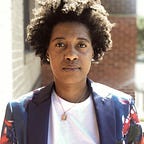Partnering with residents to fill critical information needs
Addressing community information gaps by training city residents as storytellers
Where we started
I come to journalism as a youth organizer and community coach. My purpose on the planet is to bridge people to resources and opportunities to actualize visions they have for their community. When the opportunity opened up to become part of the News Voices team in Newark, I threw myself in without hesitation. The possibility of aligning my community work with journalism was very exciting to me.
I started as the News Voices Fellow at WBGO-Newark Public Radio on July 1, 2019. I was eager, passionate and nervous. I began my journey listening to residents, community groups and stakeholders about what types of news and information they would like to see more and what information needs to be amplified throughout the city. Deep listening is where my journey began and what continues to guide this work.
I’ve created opportunities for residents to fellowship with our team and in these gatherings, we’ve focused on listening. And one theme surfaced repeatedly: What opportunities exist for residents to contribute and create content? How can a clear pipeline be created for partnership and collaboration?
Where we are — The Newark News & Story Collaborative
When I started this work in public radio, I could not imagine that we would soon be in the midst of a pandemic. We had to pivot to respond to the immediate information needs of Newark residents. In partnership with Free Press and Center for Cooperative Media, we set out to build deeper relationships with residents and stakeholders and understand their COVID-19-related information needs.
The Center for Cooperative Media hosted a virtual session to focus on relationship building, discussion of the local ecosystem, and introduction of a survey by Outlier Media to learn what information the community needed about COVID-19. During the virtual gathering, Newarkers and journalists had conversations about the city’s hierarchy of information needs. Participants also shared they would love to see more local stories of employment, housing, food insecurity and COVID-19 restrictions and testing.
Over a one-week period following the virtual session, Outlier reached out via SMS to thousands of Newarkers, asking what were their most pressing needs during the pandemic. We learned that they most needed information that would help them access food, support with virtual learning, find employment and financial support for rent and utilities.
Free Press, Outlier Media and The Center for Cooperative Media hosted a second session to discuss how local organizations might collaborate to fill those information needs. As a result of those conversations, the center has so far funded five local projects. Stories and content developed by these local projects will be shared through the Newark News & Story Collaborative.
What’s next
The north star of the Newark News & Story Collaborative is to create different forms of media and narrative projects that share the experiences and perspectives of Newarkers. We envision these as partnerships among community storytellers, local reporters and media-makers. Our community storytelling lab is the vehicle community members will use to share and amplify their experiences through this pandemic and beyond.
We will train and support residents in storytelling, media making and other creative art forms. Participants will receive a stipend and training in basic reporting skills, technical skills and effective storytelling techniques. They also will be trained in various community-engagement tactics to quickly respond to information needs.
Twenty Newark residents applied to participate in our community story lab. They have a passion for preserving legacy, centering youth voices, amplifying the stories of the formerly incarcerated and so much more. In the coming weeks, we will announce the residents who will join us as resident-reporters. I invite you to follow our work in Newark to fill critical information gaps being led in partnership with city residents. Visit www.newarkstories.com and sign up for our newsletter and learn more about how to continue to support our work.
Brit Harley is a John S. Knight Community Impact Fellow at Stanford University and community engagement reporter at WBGO in Newark, New Jersey.
